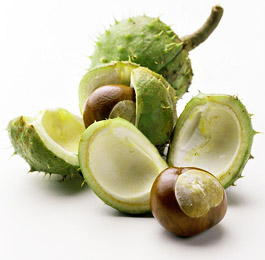Horse Chestnut
- Horse chestnut is a plant. Its seed, bark, flower, and leaves are used to make medicine. Horse chestnut contains significant amounts of a poison called esculin and can cause death if eaten raw.
Be careful not to confuse aesculus hippocastanum (Horse chestnut) with aesculus californica (California buckeye) or aesculus glabra (Ohio buckeye). Some people call any of these plants horse chestnut. This information applies to aesculus hippocastanum.
Contents
Uses
- Horse chestnut seed and leaf are used for treating varicose veins, hemorrhoids, and swollen veins (phlebitis).
- Horse chestnut seed is used for diarrhea, fever, and enlarged prostate.
- Horse chestnut seeds can be processed so that the active chemicals are separated out and concentrated. The resulting “extract” is used for treating a blood circulation problem called chronic venous insufficiency.
- Horse chestnut leaf is used for eczema, menstrual pain, soft tissue swelling from bone fracture and sprains, cough, arthritis, and joint pain.
- Horse chestnut branch bark is used for malaria and dysentery.
- Some people apply horse chestnut branch bark to the skin for lupus and skin ulcers.
Benefits
- Horse chestnut contains a substance that thins the blood. It also makes it harder for fluid to leak out of veins and capillaries and weakly promotes fluid loss through the urine to help prevent water retention (edema).
Cautions
- Horse chestnut is LIKELY SAFE for most people when a standardized seed extract product is taken by mouth for a short amount of time. Standardized products have been tested to contain exact amounts of a verified chemical. Look for products which have had the toxic substance esculin removed. Horse chestnut products can sometimes cause side effects such as dizziness, headache, stomach upset, and itching.
- Pollen from the horse chestnut flower can cause allergic reactions. Rectal (suppository) use of horse chestnut may cause inflammation and itching in the anal area.
- Raw horse chestnut seed, bark, flower, and leaf are UNSAFE and can even cause death when taken by mouth by adults or children. Signs of poisoning include stomach upset, kidney problems, muscle twitching, weakness, loss of coordination, enlarged eye pupils, vomiting, diarrhea, depression, paralysis, and stupor. Accidental ingestion of horse chestnut requires prompt medical attention. Children have been poisoned by drinking a tea made from the leaves and twigs or eating seeds.
- Pregnancy and breast-feeding: Taking the raw seed, bark, flower or leaf is UNSAFE and can lead to death. Not enough is known about the safety of using horse chestnut seed extract from which the poisonous esculin has been removed during pregnancy or breast-feeding. Stay on the safe side and avoid using horse chestnut if you are pregnant or nursing.
- Bleeding disorders: Horse chestnut might slow blood clotting. Taking horse chestnut might increase the risk of bruising and bleeding in people with bleeding disorders.
- Diabetes: Horse chestnut might lower blood sugar. If you have diabetes, watch for signs of too low blood sugar (hypoglycemia) and check your blood sugar carefully.
- Digestion problems: Horse chestnut seeds and bark can irritate the gastrointestinal (GI) tract. Don’t use it if you have bowel or stomach disorders.
- Liver disease: There is one report of liver injury associated with using horse chestnut. If you have a liver condition, it is best to avoid horse chestnut.
- Latex allergy: People who are allergic to latex might also be allergic to horse chestnut.
- Kidney disease: There is a concern that horse chestnut might make kidney disease worse. Do not use it if you have kidney problems.
- Surgery: Horse chestnut might slot blood clotting. Horse chestnut might increase the risk of bleeding if used before surgery. People using horse chestnut should stop at least 2 weeks before surgery.
Interactions
Moderate Interaction Be cautious with this combination:
- Lithium interacts with HORSE CHESTNUT: Horse chestnut might have an effect like a water pill or “diuretic.” Taking horse chestnut might decrease how well the body gets rid of lithium. This could increase how much lithium is in the body and result in serious side effects. Talk with your healthcare provider before using this product if you are taking lithium. Your lithium dose might need to be changed.
- Medications for diabetes (Antidiabetes drugs) interacts with HORSE CHESTNUT: Horse chestnut might decrease blood sugar. Diabetes medications are also used to lower blood sugar. Taking horse chestnut along with diabetes medications might cause your blood sugar to go too low. Monitor your blood sugar closely. The dose of your diabetes medication might need to be changed.
- Some medications used for diabetes include glimepiride (Amaryl), glyburide (DiaBeta, Glynase PresTab, Micronase), insulin, pioglitazone (Actos), rosiglitazone (Avandia), chlorpropamide (Diabinese), glipizide (Glucotrol), tolbutamide (Orinase), and others.
- Medications that slow blood clotting (Anticoagulant / Antiplatelet drugs) interacts with HORSE CHESTNUT: Horse chestnut seed might slow blood clotting. Taking horse chestnut seed along with medications that also slow clotting might increase the chances of bruising and bleeding.
- Some medications that slow blood clotting include aspirin, clopidogrel (Plavix), diclofenac (Voltaren, Cataflam, others), ibuprofen (Advil, Motrin, others), naproxen (Anaprox, Naprosyn, others), dalteparin (Fragmin), enoxaparin (Lovenox), heparin, warfarin (Coumadin), and others.
Other Names
Aescin, Aescine, Aesculus hippocastanum, Buckeye, Castaño de Indias, Châtaignier de Mer, Châtaignier des Chevaux, Chestnut, Escine, Faux-Châtaignier, Hippocastani Cortex, Hippocastani Flos, Hippocastani Folium, Hippocastani Semen, Hippocastanum Vulgare Gaertn, Marron Europeen, Marronnier, Marronnier Blanc, Marronnier Commun, Marronnier d’Inde, Marronnier des Chevaux, Pu, Spanish Chestnut, Venastat, Venostasin Retard, Venostat, White Chestnut.
References
Source: WebMD, “Horse Chestnut”, www.webmd.com/vitamins-supplements/

